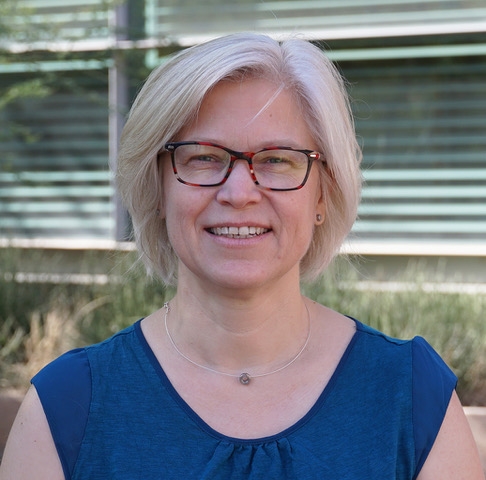Alexandra Ros of the University of Arizona will give a virtual seminar titled "How to exploit the microenvironment for bioanalysis" on Zoom from 3:30-4:30 p.m. Monday, March 1. The talk is free and open to the public.
Ros is professor in the School of Molecular Sciences and faculty member of the Center for Applied Structural Discovery at the Biodesign Institute at Arizona State University. She received her degree in chemistry from the Ruprecht-Karls-University in Heidelberg, Germany, and her Ph.D. from the Swiss Federal Institute of Technology in Lausanne (EPFL), Switzerland. Since receiving her Ph.D., Ros has been interested in microfluidic platforms and their analytical applications.
Ros joined the Biophysics and Nanoscience Group at Bielefeld University, Germany, in 2000 where she followed her interests in microfluidics and biophysics during her post doctoral training. From 2001-2007, she served as principle investigator at Bielefeld University, Germany, on several projects investigating migration mechanisms and single cell analysis in the microfluidic format. In 2007, she received her Habilitation and the Venia Legendi in Experimental Physics from Bielefeld University. Ros joined Arizona State University in 2008 as assistant professor where she was promoted to associate professor in 2014 and professor in 2020. In 2014, she also became faculty member of the Center for Applied Structural Discovery at the Biodesign Institute and was appointed visiting scientist at the Georg-August University Göttingen, Germany, in 2015-16.
She is recipient of an NSF Career Award, a Fellowship for Experienced Researchers from the Alexander-von-Humboldt Foundation, Germany, the FACSS Innovation Award and the AES Midcareer Award. Ros' current research interests include migration mechanisms in the micro- and nanoenvironment for biomolecules and sub-cellular species with a focus on electrokinetic methods, hyphenation of analytical approaches for single cell analysis, and developing microfluidic tools for emerging crystallography techniques.
Microfluidic devices and how they allow to overcome limitations in bioanalytical sciences is one of Ros's major research interests. Her lab tackles important analytical challenges through measuring and analyzing key biomolecules and biospecimen with the help of the unique microenvironments microfluidic devices offer. In her presentation, she will cover three such scenarios related to developing novel separation techniques, analyzing constituents of small cellular ensembles and sample delivery approaches to cutting-edge protein crystallography techniques.
To attend the seminar, please visit the Zoom link.
Meeting ID: 862 5015 5151
Passcode: Spring&21
Topics
Contacts
Megan Parette, communications officer
Department of Chemistry and Biochemistry
479-575-4601, mbparett@uark.edu
